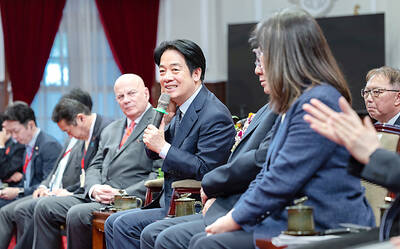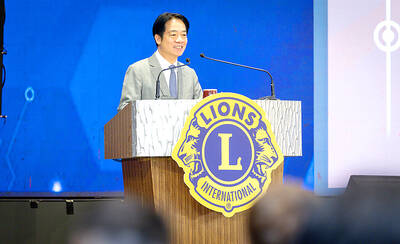Police fired on hundreds of protesters in a Tibetan area of western China, killing eight people, several overseas activist groups said. State media reported one government official was seriously injured in what it called a “riot.”
Two monks also committed suicide late last month because of government oppression, another Tibetan activist group said yesterday.
In Dharamsala, the Tibetan government-in-exile said over the weekend that the Dalai Lama could attend the Beijing Olympics if China invites him but on the condition that it relaxes its suppression in Tibet.
Reports of the killings indicate that unrest is continuing in China’s Tibetan areas despite a massive security presence in place since violent anti-government demonstrations broke out in the middle of last month in Tibet’s capital, Lhasa, and neighboring provinces.
Police fired on Buddhist monks and ordinary citizens who had marched on local government offices in Garze Tibetan Autonomous Prefecture in Sichuan Province near Tibet on Thursday, the London-based Free Tibet Campaign and the International Campaign for Tibet said.
The protesters were demanding the release of two monks who were detained after paramilitary troops searched their monastery and found photographs of the Dalai Lama, Tibet’s exiled Buddhist leader, the groups said.
The US government-funded Radio Free Asia said it had unconfirmed reports that up to 15 people were killed and dozens injured in the violence.
Calls to local police and hospitals in the area were unanswered yesterday or were answered by officials who said they had no information.
Xinhua news agency had no information on deaths or injuries but confirmed that a riot broke out near government offices in Donggu Town in Garze.
An official was “attacked and seriously wounded,” and police were “forced to fire warning shots and put down the violence,” Xinhua said.
Thursday’s incident in Garze was sparked when the government attempted to enforce “patriotic education” at a monastery, activist groups said.
The chief monk had refused to let a government team enter, and the team returned on Thursday with about 3,000 paramilitary troops.
The Tibetan Center for Human Rights and Democracy, based in India, said yesterday that two monks committed suicide last month in Sichuan’s Aba County following government oppression. Aba County has been the scene of large protests involving hundreds of monks and citizens.
One monk, identified as Lobsang Jinpa, from the Aba Kirti Monastery, killed himself on March 27, leaving a signed note saying “I do not want to live under Chinese oppression even for a minute,” the human-rights group said.
The second suicide occurred on March 30 at the Aba Gomang Monastery, when a 75-year-old monk named Legtsok took his life, telling his followers he “can’t beat the oppression anymore,” the group said.
It was impossible to verify the information since Chinese authorities have banned foreign reporters from traveling to the region.
Tibetan Prime Minister Samdhong Rinpoche said in an interview with Deutsche Presse-Agentur in Dharamsala that the Dalai Lama could attend the Olympics if China relaxes its suppression in Tibet.”
“China must release all prisoners in Tibet and treat the injured. Otherwise, if the Dalai Lama goes to Beijing to watch the opening of the Beijing Olympics, how would Tibetans feel?” Rinpoche said.

Two US House of Representatives committees yesterday condemned China’s attempt to orchestrate a crash involving Vice President Hsiao Bi-khim’s (蕭美琴) car when she visited the Czech Republic last year as vice president-elect. Czech local media in March last year reported that a Chinese diplomat had run a red light while following Hsiao’s car from the airport, and Czech intelligence last week told local media that Chinese diplomats and agents had also planned to stage a demonstrative car collision. Hsiao on Saturday shared a Reuters news report on the incident through her account on social media platform X and wrote: “I

‘BUILDING PARTNERSHIPS’: The US military’s aim is to continue to make any potential Chinese invasion more difficult than it already is, US General Ronald Clark said The likelihood of China invading Taiwan without contest is “very, very small” because the Taiwan Strait is under constant surveillance by multiple countries, a US general has said. General Ronald Clark, commanding officer of US Army Pacific (USARPAC), the US Army’s largest service component command, made the remarks during a dialogue hosted on Friday by Washington-based think tank the Center for Strategic and International Studies. Asked by the event host what the Chinese military has learned from its US counterpart over the years, Clark said that the first lesson is that the skill and will of US service members are “unmatched.” The second

STANDING TOGETHER: Amid China’s increasingly aggressive activities, nations must join forces in detecting and dealing with incursions, a Taiwanese official said Two senior Philippine officials and one former official yesterday attended the Taiwan International Ocean Forum in Taipei, the first high-level visit since the Philippines in April lifted a ban on such travel to Taiwan. The Ocean Affairs Council hosted the two-day event at the National Taiwan University Hospital International Convention Center. Philippine Navy spokesman Rear Admiral Roy Vincent Trinidad, Coast Guard spokesman Grand Commodore Jay Tarriela and former Philippine Presidential Communications Office assistant secretary Michel del Rosario participated in the forum. More than 100 officials, experts and entrepreneurs from 15 nations participated in the forum, which included discussions on countering China’s hybrid warfare

MORE DEMOCRACY: The only solution to Taiwan’s current democratic issues involves more democracy, including Constitutional Court rulings and citizens exercising their civil rights , Lai said The People’s Republic of China (PRC) is not the “motherland” of the Republic of China (ROC) and has never owned Taiwan, President William Lai (賴清德) said yesterday. The speech was the third in a series of 10 that Lai is scheduled to deliver across Taiwan. Taiwan is facing external threats from China, Lai said at a Lions Clubs International banquet in Hsinchu. For example, on June 21 the army detected 12 Chinese aircraft, eight of which entered Taiwanese waters, as well as six Chinese warships that remained in the waters around Taiwan, he said. Beyond military and political intimidation, Taiwan